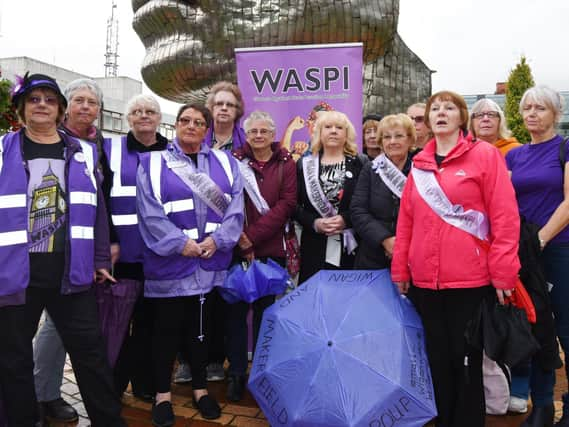Wigan Waspi women share experiences of lockdown


Women born in the 1950s have been protesting for several years about the way the Government carried out the raising of the age at which they would be able to claim their state pension.
They say poor communication and a lack of notice meant there were no fair transition arrangements or opportunities to sort out funding their retirements, leaving them having to soldier on in jobs well into their 60s or live on incomes much smaller than they had anticipated.
Advertisement
Hide AdAdvertisement
Hide AdFor those working on the front line it has been a particularly stressful few months as older people have run much higher risks of becoming seriously ill or dying with Covid-19, while for others adapting to home working or roles involving technology has posed challenges.
Maureen Akdemir said: “As I work within the NHS we were still to go to work as normal, but this was anything but normal.
“Our site essentially deals with out-patient departments but no patients were being allowed into the hospital for their appointments.
“New ways had to be devised to ‘see’ these patients. Telephone consultations and video calling became the norm.
Advertisement
Hide AdAdvertisement
Hide Ad“As some of my work colleagues were deployed to work on the front line helping to treat those coronavirus patients who needed hospital treatment, the rest of us had to try to man the fort and keep the department ticking over.
“Lockdown meant that I was unable to visit my family and friends and as I live alone I found this to be a lonely time, so going to work was really a godsend. At least I could get out every day and talk to real people, not just on telephone, and one good thing to come out of this was there was hardly any traffic on the road so the commute to and from work was a breeze.”
Hillary Walker, who works as a funeral celebrant, said: “In normal times a funeral director would contact me with details for a forthcoming funeral and I would liaise with the next of kin, arranging to visit the family as soon as possible to give me a picture of the person who has died.
“I would put together a service, including a personal tribute, and attend either the crematorium or graveside to deliver the funeral service.
“However, in lockdown everything changed.
Advertisement
Hide AdAdvertisement
Hide Ad“I couldn’t visit families anymore which meant using whatever means of communication they were happy with.
“Most people were uncomfortable with Zoom or Skype, a lot of elderly relatives didn’t use email,so the telephone which became the favourite means of communication.
“This process was difficult for all concerned.
“The whole issue of getting to know grieving relatives and hopefully gaining their trust is built on good communication and sadly, no matter how many times we spoke on the phone, the first time the family would meet me would be at the funeral, two metres apart with no friendly handshake or an arm around the shoulder to offer support.
“Crematoriums were bare, offering only 10 carefully-arranged seats, the curtains had to close in every instance to keep people from touching the coffin and personal booklets or orders of service were not allowed.
Advertisement
Hide AdAdvertisement
Hide Ad“In some instances, due to age and ill health, there were only two mourners present.”
The World Health Organisation (WHO) advises anyone over 60 to take particular care, and some Waspi women have had to self-isolate.
Others have done volunteering work or been supporting family members, with some Waspi women experiencing worry and pessimism about the future.
Ann Edwards, Wigan and Makerfield Waspi joint co-ordinator, said: “I have found the lockdown very difficult to cope with.
“It’s a constant rollercoaster ride of emotions.
Advertisement
Hide AdAdvertisement
Hide Ad“I’m a Type 2 diabetic and my husband is 82 this year. This means both of us are quite high risk.
“At first it all terrified me. But our family have looked after us until we were able to get deliveries.
“Our neighbours formed a What’s App group to support each other. There are lots of residents over 60 in the cul-de-sac we live in.
“Ladies in our group have been bereaved in lockdown, others have shielding family members and others are working through it in high risk jobs. Trying to see a future through this tunnel is difficult.”
Advertisement
Hide AdAdvertisement
Hide AdSharon McDonald said: “It feels like life is on pause. My son works in the housing department of West Lancashire so has been working from home, his partner has just finished her degree and is now working as a radiographer in Preston, and my granddaughter is an apprentice at a dental surgery on furlough.
“Luckily I have my teacher pension so I do not have any financial problems but I worry about my grandchildren’s futures. I cannot help them as much as I want to without my state pension.
"More time to think makes me very sad.”